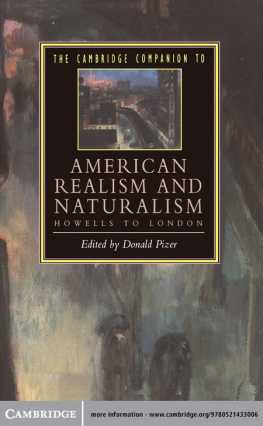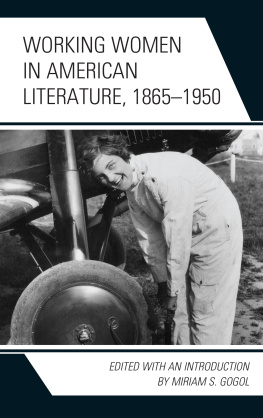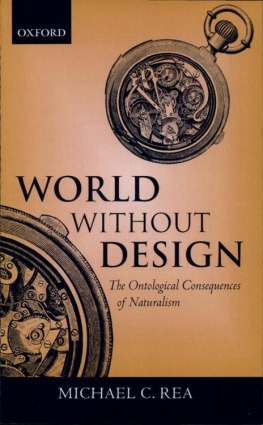THE CAMBRIDGE COMPANION TO
AMERICAN REALISM AND NATURALISM
This Companion offers a look at a number of issues related to the terms realism and naturalism, which have long served to designate major late-nineteenth-century American fiction. The Introduction seeks both to discuss the problems inherent in the use of these two terms in relation to late-nineteenth-century fiction and to describe the history of previous efforts to make them expressive of American writing of this period. The Companion includes eleven essays that fall into three categories: the historical context of realism and naturalism (Louis J. Budd and Richard Lehan); critical approaches to the movements since the early 1970s (Michael Anesko and Elizabeth Ammons); and a full-scale discussion of twelve major texts, from William Dean Howellss The Rise of Silas Lapham to James Weldon Johnsons The Autobiography of an Ex-Colored Man.
THE CAMBRIDGE COMPANION TO
AMERICAN REALISM AND NATURALISM
Howells to London
EDITED BY
DONALD PIZER
Tulane University

PUBLISHED BY THE PRESS SYNDICATE OF THE UNIVERSITY OF CAMBRIDGE
The Pitt Building, Trumpington Street, Cambridge, United Kingdom
CAMBRIDGE UNIVERSITY PRESS
The Edinburgh Building, Cambridge CB2 2RU, UK http://www.cup.cam.ac.uk
40 West 20th Street, New York, NY 10011-4211, USA http://www.cup.org
10 Stamford Road, Oakleigh, Melbourne 3166, Australia
Ruiz de Alarcn 13, 28014 Madrid, Spain
Cambridge University Press 1995
This book is in copyright. Subject to statutory exception and to the provisions of relevant collective licensing agreements, no reproduction of any part may take place without the written permission of Cambridge University Press.
First published 1995
Reprinted 1996, 1999
Typeset in Sabon
A catalog record for this book is available from the British Library
Library of Congress Cataloging in Publication Data is available
ISBN 0 521 43876 4 paperback
Transferred to digital printing 2002
CONTENTS
CONTRIBUTORS
ELIZABETH AMMONS is Professor of English and American Studies and Dean of Humanities and Arts at Tufts University. She is the author of Edith Whartons Argument with America (1980) and Conflicting Stories: American Women Writers at the Turn into the Twentieth Century (1991). She is a coeditor of the forthcoming Oxford Companion to Womens Writing in the United States.
MICHAEL ANESKO is Associate Professor of English at Pennsylvania State University, University Park. He has published Friction with the Market: Henry James and the Profession of Authorship (1986) and an edition of Horatio Algers Ragged Dick (1993).
LOUIS J. BUDD is James B. Duke Professor of English at Duke University. Among his books are Mark Twain: Social Philosopher (1962), Robert Herrick (1971), and Our Mark Twain: The Making of His Public Personality (1983).
JOHN W. CROWLEY is Professor of English at Syracuse University. His books include George Cabot Lodge (1976), The Black Hearts Truth: The Early Career of W. D. Howells (1985), The Mask of Fiction: Essays on W. D. Howells (1989), and The White Logic: Alcoholism and Gender in American Modernist Fiction (1994).
BLANCHE H. GELFANT is the Robert E. Maxwell 23 Professor at Dartmouth College. She has published The American City Novel (1954), Women Writing in America: Voices in Collage (1984), and Cross-Cultural Reckonings: A Triptych of Russian, American, and Canadian Texts.
BARBARA HOCHMAN is Lecturer in English at Tel Aviv University. As well as essays on Edith Wharton and Theodore Dreiser, she has published The Art of Frank Norris, Storyteller (1988).
RICHARD LEHAN is Professor of English at the University of California, Los Angeles. He is the author of F. Scott Fitzgerald and the Craft of Fiction(1966), Theodore Dreiser: His World and His Novels (1969), A Dangerous Crossing: French Literary Existentialism and the Modern American Novel (1973), and The Great Gatsby: The Limits of Wonder (1990).
J. C. LEVENSON is Professor of English at the University of Virginia. He is the author of The Mind and Art of Henry Adams (1957), coeditor of The Letters of Henry Adams (1982), and editor of Stephen Cranes Prose and Poetry (1984) in the Library of America.
DONALD PIZER is the Pierce Butler Professor of English at Tulane University. Among his books are Realism and Naturalism in Nineteenth-Century American Literature (1966; rev. ed., 1984), Twentieth-Century American Literary Naturalism: An Interpretation (1982), The Theory and Practice of American Literary Naturalism: Selected Essays and Reviews (1993), and studies of the fiction of Frank Norris, Theodore Dreiser, and John Dos Passos.
TOM QUIRK is Professor of English at the University of Missouri, Columbia. He is the author of Bergson and American Culture: The Worlds of Willa Cather and Wallace Stevens (1990) and Coming to Grips with Huckleberry Finn: Essays on a Book, a Boy, and a Man (1993) and is coeditor of Writing the American Classics (1990).
JACQUELINE TAVERNIER-COURBIN is Professor of English at the University of Ottawa. She is the author of Ernest Hemingways A Moveable Feast: The Making of Myth (1991) and is editor of Critical Essays on Jack London (1983) and the journal Thalia: Studies in Literary Humor.
KENNETH W. WARREN is Associate Professor of English at the University of Chicago. He has published Black and White Strangers: Race and American Literary Realism (1993).
CHRONOLOGY
| 1865 | Thirteenth Amendment abolishes slavery; Lee surrenders at Appomattox; Lincoln assassinated, Andrew Johnson succeeds (president to 1869).
Mark Twain, The Celebrated Jumping Frog of Calaveras County.
Walt Whitman, Drum-Taps. |
| 1866 | Atlantic cable completed; Ku Klux Klan founded. Fyodor Dostoeveski, Crime and Punishment.
John Greenleaf Whittier, Snow-Bound. |
| 1867 | Reconstruction Act; Alfred Nobel perfects dynamite.
John W. De Forest, Miss Ravenels Conversion from Secession to Loyalty.
George Washington Harris, Sut Lovingood Yarns. |
| 1868 | Effort to impeach President Johnson narrowly fails; Fourteenth Amendment guaranteeing civil rights. |
| 1869 | Ulysses S. Grant, president 186977; Suez Canal opens; Union Pacific-Central Pacific transcontinental railroad completed; Wyoming passes first womans suffrage act in the United States. Matthew Arnold, Culture and Anarchy; John Stuart Mill, The Subjection of Women.
Harriet Beecher Stowe, Oldtown Folks.
Mark Twain, The Innocents Abroad. |
| 1870 | Franco-Prussian War (France capitulates in 1871); John D. Rockefeller founds the Standard Oil Company; death of Charles Dickens.
Bret Harte, The Luck of Roaring Camp and Other Sketches. |
| 1871 | Chicago destroyed by fire; Smith College founded. Emile Zola publishes the first novel in his Rougon-Macquart series (completed in 1893). Charles Darwin, The Descent of Man. Edward Eggleston, The Hoosier Schoolmaster.
William Dean Howells, Their Wedding Journey.
Walt Whitman, Democratic Vistas. |
| 1872 |







